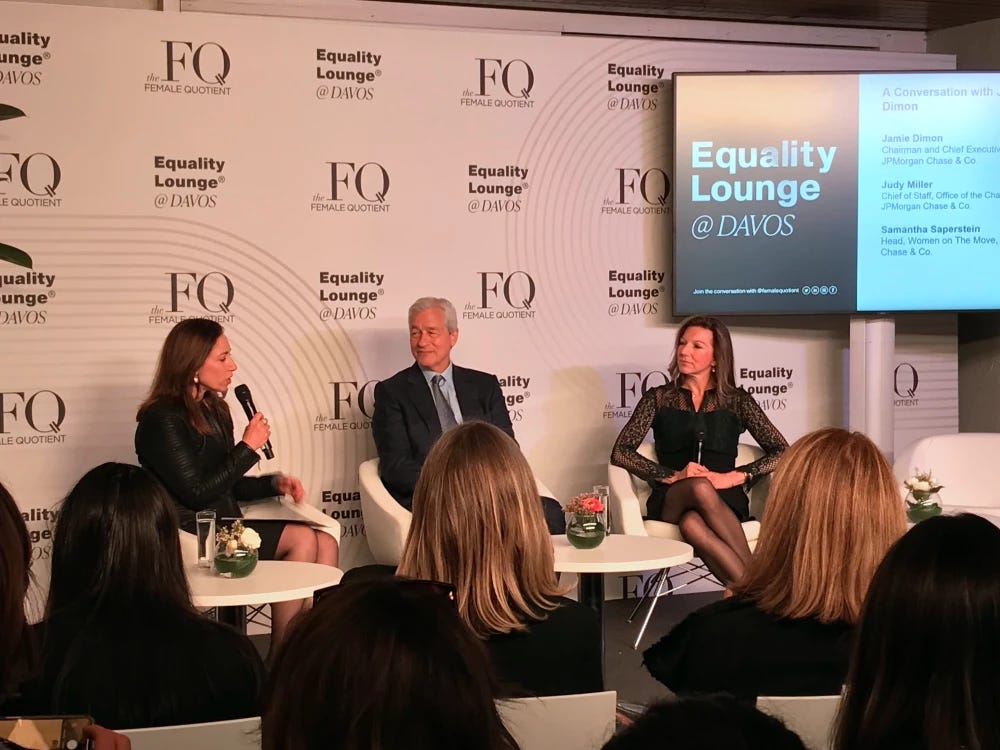Tower of Davos
"Never make deals with assholes and criminals."
DAVOS, SWITZERLAND — Come, let us make a city and a tower, the top whereof may reach to heaven: and let us make our name famous before we be scattered abroad into all lands.
The thing about themes is that they tend to repeat.
The ultra-wealthy and powerful have gathered again for the World Economic Forum’s annual summit in the Swiss Alps. The Davos summit claims it’s committed, by way of political action, to "improving the state of the world." How does the summit plan achieve such a lofty goal, and what should undergird its efforts? Government regulations, economic interdependency, and dialogue. Nothing more, and certainly nothing outside man’s immediate control.
To call the summit secular would be an understatement. It’s aggressively secular. Apart from the occasional Buddhist monk and the centuries-old churches that dot the Swiss countryside, Davos almost makes one forget that organized religion even exists. One gets the distinct impression that organized religion is not only unwelcome at Davos but also actively discouraged from participating. This might explain the gathering's many contradictions and why it appears doomed to fail. It certainly doesn’t seem destined for the same long-lived success that has followed man’s two most remarkable achievements in self-determination: the United States Constitution and the Magna Carta.
The chief distinction between these accomplishments and Davos is that the U.S. Constitution and the Magna Carta are unified by a shared understanding of what is good, rooted ultimately in natural law and the divine. Davos, on the other hand, takes a strictly secular approach. It is, therefore, more like a carnival for the blind: would-be do-gooders bumbling around, relying entirely on a worldly, and thus inherently fallible, understanding of bonum, verum, and pulchrum.
And where there is an absence of clarity drawn from a unifying understanding of natural law and the divine, Davos has an abundance of incoherent and inconsistent principles.
Trudge your way up the main thoroughfare, stomping through snow that has been beaten into a gray pulp by the gathering’s many speakers and attendees, and marvel at the fact the Equality Lounge ("The Place for Conscious Leaders"), which hosts the Female Quotient’s nearly all-female panels and audience, is situated next door to the Mohammed bin Salman Foundation’s Youth Majlis.
You can't miss them. They’re across the street from Blockchain Hub Davos and Ukraine House Davos.
Casually bump into Wendy Diamond, founder of Women's Entrepreneurship Day, at a Wall Street Journal-hosted cocktail party and hear about her efforts to empower and honor women. Exit the building, whose halls are lined with signs advertising Audi limousine services and whose office spaces host HSBC, Pfizer, and IBM, and head across town to hear an address by Liu He, vice premier of the People's Republic of China, where sex-selective abortions are the norm. Hear from multiple speakers on the grave evils of Russia, whose representatives are not welcome this year at Davos, and ponder why members of the Chinese Communist Party, which is waging a genocide against China's Uyghur population, are not similarly unwelcome.
Hop over to the Freie Evangelische Gemeinde Davos, a nondenominational evangelical church that, for the week, has been converted into a space for parties and events hosted jointly by CNBC International and the Filecoin Foundation. Mingle at a boozy Financial Times social hour with, among other people, representatives from the "ecocide" movement, which is lobbying the Hague to treat carbon emissions and deforestation with the same severity as genocide. Again, ponder why representatives of the CCP are not treated as personae non gratae at Davos. Take a ski lift to the Hotel Schatzalp to attend the Swedish Lunch and meet along the way an American professor best described as a Davos groupie. It’s her fifth year at the summit. She'll tell you that her best experiences, indeed her best friends, are all from Davos. It’s not just a political movement. It’s a lifestyle. Listen carefully as she explains why climate change is "the new Holocaust."
Like the Holocaust, she says, "We know it’s wrong, but we do it anyway."
Reach the mountaintop, and the professor disappears into the crowd, hugging and kissing old friends at the swanky indoor/outdoor affair with enough champagne to drown a sorority. At the luncheon, meet representatives from the Massachusetts Institute of Technology and learn about their collective efforts to wean modern man from fossil fuels. Try not to think about how the luncheon’s 100-plus guests, including the American professor and the MIT representatives, made their way into Switzerland. They likely didn't walk.
All up and down the small Swiss town of Davos, whose shops and restaurants have been converted to serve the hosting needs of the WEF and the dozens of unrelated organizations looking to benefit from their proximity to the summit’s high-profile attendees, there are posters whose slogans amount to absolutely nothing; platitudes that crumble under even the slightest scrutiny. “What if peace of mind came from mindful technology?”; “Everything starts with ambition”; and “Growth in an age of uncertainty.”
What age has ever been certain?
The aggressively secular event continues apace, headlined by people who seem genuinely concerned for the well-being of the world’s population. The problem is that these self-professed experts have no clearer idea of what they want or how to achieve it than the people they ostensibly serve.
Attend any panel, and you’ll hear speakers preach the gospel of "peace through tech," "peace through sustainability," and "peace through economic interdependency."
Try to ignore the very real and very deadly war in Ukraine. Try, but you’ll probably fail.
"The only thing that matters right now is Russia," JPMorgan Chase CEO Jamie Dimon says at a private event hosted by the Female Quotient. The invasion is a constant topic of discussion at Davos, a looming cloud that stands in stark contrast to the gathering’s otherwise flowery, optimistic themes of international cooperation and partnership. It's enough to give one whiplash.
But this is what happens when man relies entirely on himself. He is an erratic animal, prone to ignorance, inconsistencies, and passion. In the absence of something greater than himself, he reverts to his baser tendencies. It should not be surprising that a movement as outwardly secular as Davos should feature so much ignorance, cognitive dissonance, and raw appeals to emotion.
At Davos, few, if any, can explain coherently or realistically the "how" of the movement's stated goals or what social "improvements" should look like. There doesn’t appear to be any unifying idea of what "good" even means. WEF officials and attendees know only that they want to ascend to heaven. But lofty aspirations ignorantly informed typically end in failure, if not outright catastrophe. The road to hell is paved with good intentions, as the saying goes. And if Davos hasn’t hurt the average citizen directly, it certainly hasn’t helped him, even five decades after the summit first began.
Unhappiness worldwide reached record highs in 2022, according to Gallup, a troubling trend that takes place against the backdrop of the WEF’s 50-plus-year effort to improve “the state of the world." As attendees bumble around in Switzerland every year with only a vague, undefined understanding of "good," exploring and promoting new regulations meant to "improve" the global community, the average person has grown more miserable, more stressed, and more unhappy. It has gotten to the point where mental health professionals are recommending "coping toolboxes," packages that include anything from stress toys to essential oil sprays to sugar-free chewing gum.
Most notably, Gallup’s "well-being" score for the top 20% has increased over the past 17 years, while the same metric has decreased for the bottom 20%. The rich get happier, while the poor get sadder. Or, put more bluntly, while the type of person who headlines WEF speaking events has grown wealthier and more comfortable, the kind of person who can’t afford a plane ticket to Switzerland in the first place has grown more despondent. You’d think that global unhappiness would at least hold steady after 50 years of WEF political engagement, but you’d be wrong. Global unhappiness has seen sharp increases across the board, inching ever upward year after year. We shouldn’t be surprised. How much "good" can an international conference accomplish when the conference seems unable to define the word "good"?
Like Babel, Davos seeks by man’s efforts alone to conquer the world and mold it to his liking. But, like the fate of Babel itself, there is no unifying language to guide and direct the project. WEF officials and speakers have only an ambiguous sense of what they want and how they expect to get it, and every man has his unique interpretation.
In the posh European ski resort town of Davos, situated comfortably and safely in the Swiss Alps, the most privileged people in the world lecture one another about topics they hardly understand.
Happily, though, not everyone who appeared at Davos this year was so grossly disconnected from the realities of the world.
“Never make deals with assholes and criminals,” said Ukraine parliamentarian Maryan Zablotskyy at the "Path Forward: Liberal Democracies and Technology Policy" event in Davos, referring to the West’s overwhelmingly naive understanding of China and Russia. "It will always end badly. Forget it."
Finally, someone who knows what he’s talking about.
Speaking of criminals, who invited the vice premier of the People's Republic of China to this party?
This article was published originally by the Washington Examiner on Jan. 28, 2023.






One Hellfire drone at the right time and we are done with these useless pommes.
They are united. United in their ambition, the need for recognition and admiration, their insatiable greed, their machiavellian methods, their complete disregard for ordinary people, their determination to never do any real work, and their complete sociopathic desires. They re all strongly united in that sense. I notice it attracts a lot of females and feminized men. They all talk like psychopaths. They always promote females, even though their men are in the gutter. Yet we don't see many female trades people. Or anything that involves keeping the lights on. They are only promoted in jobs that rely go grift, taxpayer dollars, and government employment. Anything with a white collar and a large paycheck - they'll skip the rest thanks. They don't like to work for a living, but do want us to think that 65% of university graduates being female is somehow making them oppressed. The west is finished. These people are our enemies. The goal they have set for themselves is to persuade us otherwise. That is quite a uniting objective. They want to see you poor, hungry, unhappy, and to kiss their feet. What has Russia done to me again? I forgot.